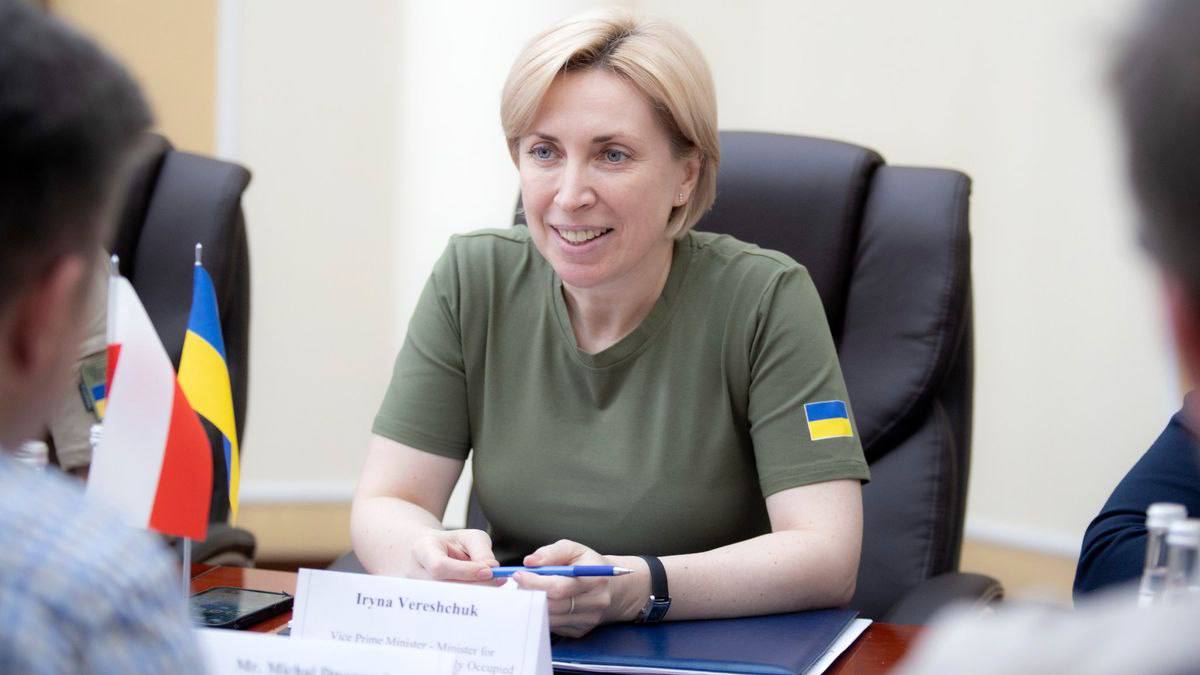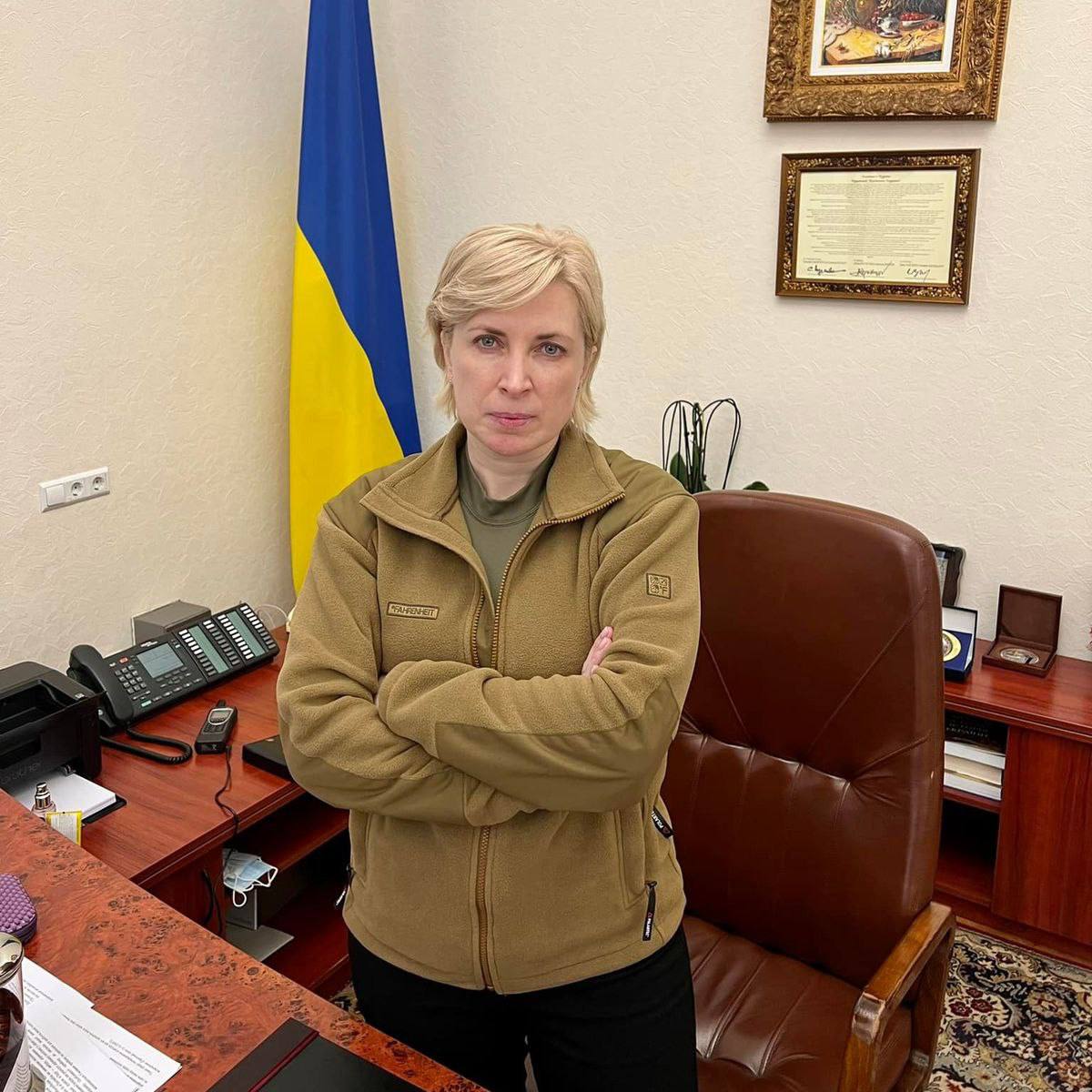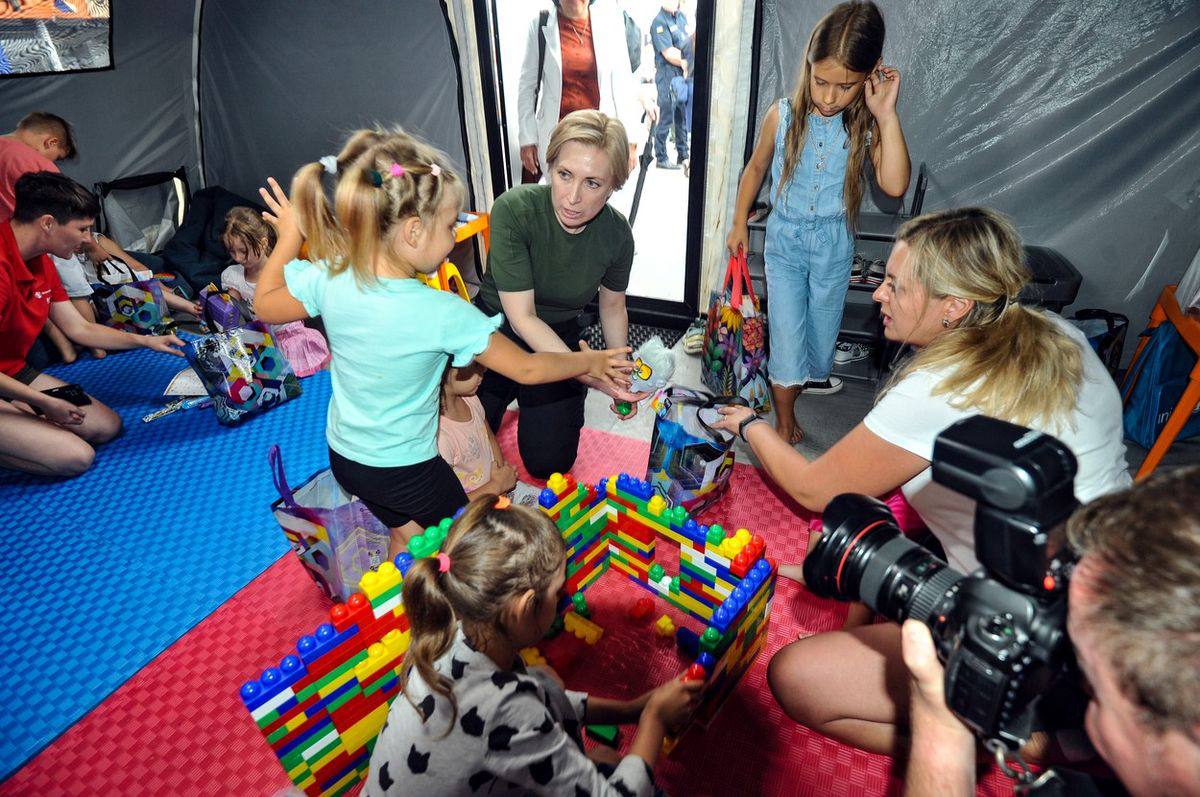
Vice Prime Minister of Ukraine Iryna Vereshchuk gave an exclusive interview to Seznam Zpravy.
“Due to the threat of a missile attack, we were sent to a bunker where we spent two months with the President, the Prime Minister and other people,” recalls Vice Prime Minister of Ukraine Iryna Vereshchuk. Seznam Zpravy contacted her online shortly before the first anniversary of the Russian invasion, which falls on February 24th.
Vereshchuk, 43, is responsible for the reintegration of the temporarily occupied territories of Ukraine, i.e. the reintegration of southern Ukraine, Crimea and Donbas. “The peninsula has been under Russian occupation for nine years, and after its liberation, we will have to build a state there from scratch, because there is not even our local government there,” the politician explains.
“We are happy that Pavel will be President”
In the interview, she talks about the humanitarian situation in Ukraine, the adaptation of the energy network to Russian attacks, and the deportation of Ukrainian children to Russia.
Vereschuk also praised the Czech Republic’s assistance to Ukraine and commented on the results of the Czech presidential election. “We are very pleased that Petr Pavel, who also supports Ukraine, has become the new President of the Czech Republic, and we know that this support will continue,” the politician said. She added that Ukraine’s victory over Russia “will also be a victory for the Czech people.” “We will celebrate it together,” said the Deputy Prime Minister, who has held the seat since December 2021.
- How do you remember the beginning of the Russian invasion of Ukraine? When and how did you learn about the Russian attack?
“I remember that day very well. I was woken up by explosions on the left bank of the Dnipro River in Kyiv. My husband and I immediately went to our workplaces. He is a military man. From the very morning I was on the seventh floor of the Ukrainian government office. I gathered my team, and we started acting according to the instructions and response plans we had prepared in advance.”
- How did the government function in that situation? What were its first steps?
Members of the Ukrainian government were summoned to the President’s Office, where the first briefing took place. We appealed to the international community and Russia to open humanitarian corridors. Later, because of the threat of a missile attack, we were sent to a bunker where we spent two months together with the President, the Prime Minister and other people. Some ministers had to work from the western part of Ukraine.
I remember very well Mr. President, who maintained a working atmosphere despite the intense pressure and emotional tension. He would ask us how we were doing, even made jokes. When we asked him what we should do, he had only one answer: work. I also remember him saying goodbye to his wife, which was very touching. At that time, no one knew how everything would turn out.
- You had to part with your family…
My husband has been fighting since the first day of the Russian offensive in Donbas, which began in 2014. We are both responsible for our teams and the fate of other people. We always had our suitcases packed in our closets. I also have a military background, so I understood very well what the situation meant. But no one knew the scale of this aggressive and unjust war, that Russians would hit residential buildings and civilians would die. We could not imagine it.
We thought there was international law that guaranteed the opening of humanitarian corridors. Together with the International Committee of the Red Cross, the UN and other organizations, we developed a humanitarian response plan. We relied on structures that we believed absolutely could not allow Russia to commit such violent, cynical and aggressive actions and crimes against humanity. But all this was happening before our eyes.
For a long time, Russia refused to open humanitarian corridors, shelling residential buildings to make Ukrainians experience shock and pain. We will remember the first days of the war for the rest of our lives. But Ukrainians have become stronger. We have a leader, an army, a nation, and we are ready to fight.
- In the first days of the Russian invasion, the whole world saw crowded train stations, fear and confusion in the eyes of Ukrainians, and the country was experiencing a huge humanitarian crisis. What is the situation now?
 Last February and March were truly terrible. Now we have managed to get the situation under control, and even in the winter we did not see hundreds of thousands of people fleeing abroad as predicted. The energy terrorism that Russia launched in October, trying to deprive Ukrainians of electricity and water, did not work.
Last February and March were truly terrible. Now we have managed to get the situation under control, and even in the winter we did not see hundreds of thousands of people fleeing abroad as predicted. The energy terrorism that Russia launched in October, trying to deprive Ukrainians of electricity and water, did not work.
Together with our international partners, we managed to coordinate the situation and start the planned evacuation from Donetsk, Zaporizhzhia and Kharkiv regions in the summer, and after their liberation, also from Kherson region. Thus, the enemy failed to spread panic.
Every day we send evacuation trains to take people to the west of Ukraine, where we accommodate them. Thanks to this, we have managed to cope with the migration wave. In recent months, we have transported about 305,000 people. Some of them go abroad, but the majority stay in Ukraine and prepare to integrate into society in their new location.
- You mentioned the de-occupation of Kharkiv and Kherson regions. What is the current situation in these regions, which are subject to daily Russian shelling even after liberation?
The situation is very complicated. Even if the aggressor wants to leave behind a scorched earth, Russia has not been there and will never be there. People in these regions live under daily aggressive shelling. In the Kherson region, they are only 500 meters from the enemy. Obviously, they are within the range of small arms, and so the Russians are using all the weapons they have. They are targeting civilians, and this is, of course, a huge crime.
We are trying to evacuate the locals and are taking out of the Kherson region mainly people with limited mobility, the elderly and women with children. Saving people is our priority. I hope that in the spring we will drive the enemy out and our people will return to Kherson region.
- How do you deal with the energy crisis during the winter months?
The Russians hoped to destroy us with energy terrorism, but they failed. We survived the winter, and even the power cuts and other complications did not break us or force us to make concessions. We should thank our power engineers for their excellent work and coordination.
We have managed to set up the power system so that permanent blackouts do not occur in all regions at the same time, and rolling blackouts are scheduled. The fact that in Kyiv, for example, there have been no power outages for two or three days recently is a huge achievement. We are also looking at the calendar with hope – spring is just around the corner and we will definitely win.
- What about internally displaced persons? How many of them are there and what problems do they most often face? What kind of assistance do they receive from the state?
We’re registering 4.8 million internally displaced persons. In fact, there are almost seven million of them, but some of them do not claim this status and try to help others. We have special programs to support such people. Last year alone, we allocated 58 billion hryvnias (about 35 billion CZK – ed. note) for humanitarian payments to internally displaced persons. We also provide assistance in finding a job.
We also cooperate with international organizations such as the UN High Commissioner for Refugees, UNICEF and others. Their programs work very well, and without them it would be very difficult for us. We are very grateful for this help.
I would as well like to thank the governments of the countries that are helping Ukraine and providing the necessary things for temporary accommodation centers, where one million internally displaced people are now living. There are now more than six thousand such centers in Ukraine.
We can say that 2022 was the “year of evacuation,” but this year will be the year of integration. Providing internally displaced persons with jobs and housing is our priority.
- Almost a million Ukrainians now live in modular houses. How are they getting through winter? Does the state have the ability to provide everyone with permanent housing?
Yes, it does. This plan is being implemented by the Vice Prime Minister for the Restoration of Ukraine. It includes various programs related to the construction of apartments, mortgages, loans and other ways to provide housing for internally displaced people.
We also have a great program where 33% of the funds for housing are provided by regional authorities, another 33% by international partners, and the rest is paid by local companies. There are more programs like this and they are widespread, especially in western part of Ukraine, which has a lot of experience in this area. So people get at least some security guarantees, access to housing and, most importantly, to work, and they don’t have to stand in line for a humanitarian package.
“A crime against our children”
- Russians have abducted thousands of children from Ukraine. According to available information, only 128 deportees have been returned so far. How are the negotiations going and how many children still need to be returned to their homeland?
In fact, it is very frightening that in the 21st century we have to see how helplessly the world is watching this genocide. This is a deliberate, conscious destruction of the Ukrainian nation. Russia is deliberately creating re-education camps, depriving our Ukrainian children of their identity, sending them to an unfamiliar environment and forcing them to speak a foreign language. This is a real genocide, and I hope that the world will not turn a blind eye to what they are doing.
We’ve emphasized that we have no orphans, that all children have guardians. Russia is well aware that Ukraine prohibits the adoption of Ukrainian children and demands their return.
Instead, Russia deprives us of information about the location of these children. Sometimes it happens that Russians adopt children who have relatives in Ukraine, and we try to use all possible tools to bring them home. They say that they are taking them to Russia for evacuation or medical examination, but this is not the case.
This is the biggest crime because adults can take care of themselves and report their location, and children are helpless in this sense. Russia will bear both legal and political responsibility for this genocide. As will all others who participated in it.
I am sorry that the world does not have the tools to stop this crime against our children.
- You recently said that the Ukrainian government has a plan for the reintegration of Crimea. Can we talk about a plan of first steps at this point?
The Strategic Plan for the Reintegration of Crimea was signed by President Volodymyr Zelensky in 2021. At that time, the plan did not include a military component, but now it is clear that it will not be possible to return Crimea through diplomatic and political means. The task of our army is to demilitarize the occupied territory, and our task is to reintegrate and resocialize it. We have experience of de-occupation of Kherson and Kharkiv regions, so we know what did not work, what mistakes were made and what could have been done differently.
Now we need to prepare a personnel reserve and military administration to ensure that Ukraine is ready to liberate Crimea. Russia occupied the peninsula nine years ago, and after its liberation, we will have to build a state there from scratch, because there is not even our local government there. Neither the authorities nor the people who stayed there are institutionally prepared. So now we are preparing a personnel reserve. My position is that our veterans should be a part of this – they are motivated, competent, and many of them are from Crimea.
- How much has Ukraine changed over the last year of war?
We can see with our own eyes that Ukraine has indeed changed a lot – a great transformation into the state we aspired to. Despite all the pain, tears, losses and economic damage, we have become stronger.
We can say that Ukraine is transforming from a cancer patient to a new healthy organism full of energy. We need enough energy to defeat an external enemy, but we also need to build an internal system that is stable and defensible. So that what happened in Crimea will never happen again. No one will ask us what Russia means to us anymore. And this gives us a great chance, optimism and hope for the future.
Look at how Ukraine is fighting corruption. It’s no secret how much influence the oligarchs have had on all branches of the Ukrainian government. Unfortunately, this is a terrible corruption machine of the post-Soviet continent, which, by the way, Russia also used against us.
But now we see heads falling and what steps Volodymyr Zelensky is taking. I want to thank him for his approach and for not being afraid of these steps. Yes, the war has accelerated all these processes, but today I can say that the influence of the oligarchs in Ukraine has been neutralized, which offers us great opportunities.
- In your opinion, has the attitude of Ukrainians towards the President changed?
I travel to the regions every week and talk to Ukrainians, so I know that they are very supportive of Volodymyr Oleksandrovych. They admire his honesty and openness. When he stayed in Ukraine after the Russian invasion began, he became a kind of beacon for all of us, showing us how to fight. And this, of course, motivates and inspires people and his team. Ukraine has a President who we are not ashamed of and who will lead the country to victory.
- The Czech Republic also has been helping Ukraine from the very beginning. Could this have an impact on the post-war reconstruction of the country?
The Czech Republic is a great friend and partner of ours who has been supporting us since the first days of Russian aggression. In February, along with Poland, it was one of the first countries to clearly and unequivocally state that it is on the side of Ukraine and will provide us with assistance. We are very grateful to the Czechs for this.
And, of course, we thank the newly elected pro-European President. We are very pleased that the new President of the Czech Republic is Petr Pavel, who also supports Ukraine, and we know that this support will continue.
Of course, we invite Czech companies to participate in the rebuilding of Ukraine, we know, for example, about the successful Czech arms industry. We will be very grateful when we create our joint Ukrainian-Czech enterprises and work together with our brothers and sisters to rebuild Ukrainian cities and villages.
- What will be the first thing you do after Ukraine’s victory?
I will sleep for the whole two days. We will definitely celebrate our victory together, because it will also be a victory for the Czech people. Because we deserve it. We are people of good will who respect freedom, values and democracy. The Czech Republic knows very well what the Russian regime looks like on the streets.
You can read the original version of the interview here.

